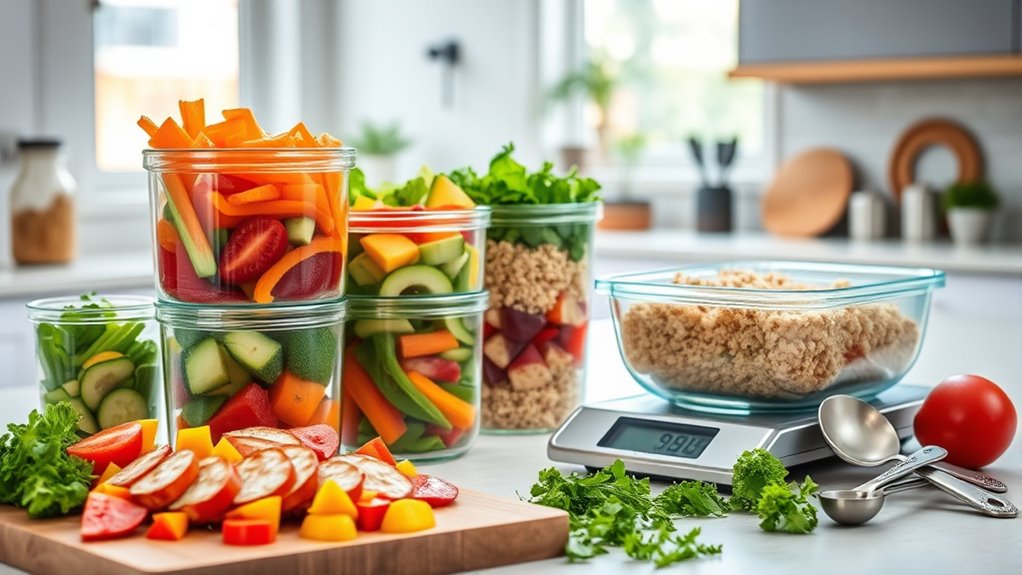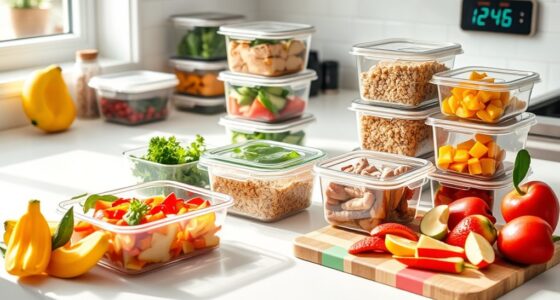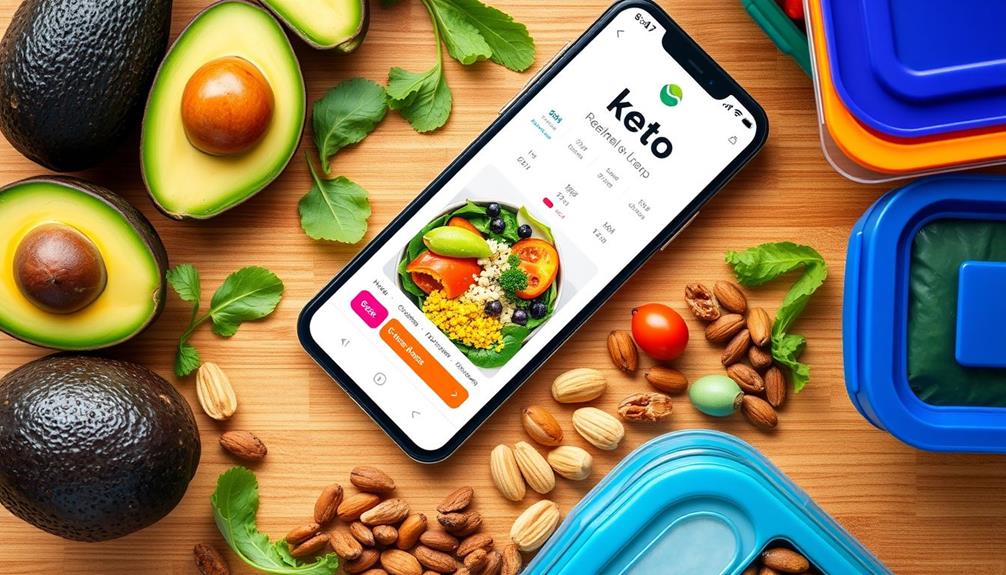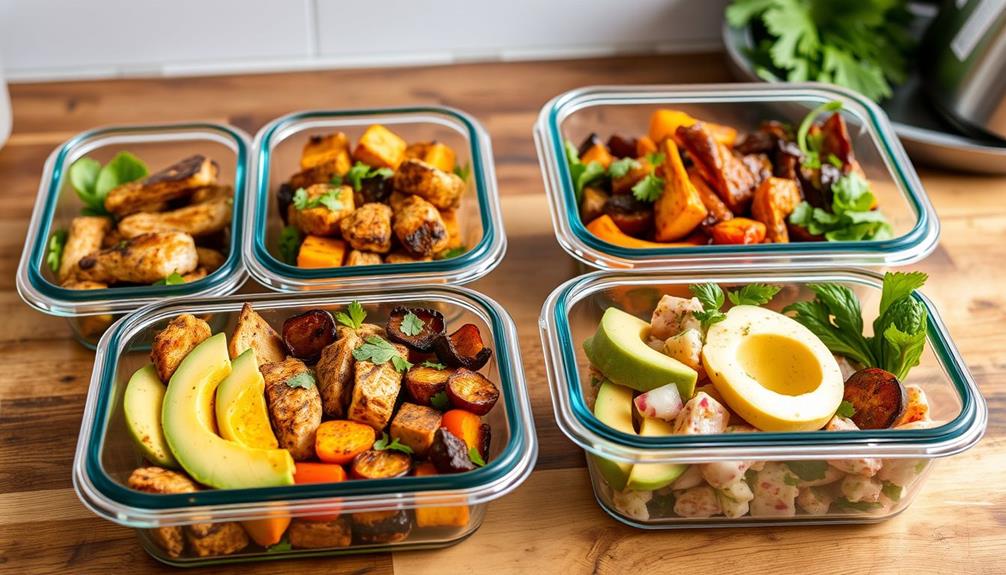Many people believe meal prepping is time-consuming, costly, and only for fitness buffs, but that’s a myth. In reality, you can save time with simple techniques like batch cooking, using slow cookers, and prepping versatile ingredients. It’s also budget-friendly if you buy in bulk and plan around sales. Plus, variety comes from adding different seasonings and sauces. Keep exploring, and you’ll discover how flexible and easy healthy meal prep can be for any lifestyle.
Key Takeaways
- Meal prepping isn’t time-consuming; simple techniques and tools make it quick and manageable for any schedule.
- Cost-effective strategies like bulk buying and seasonal ingredients make healthy meal prep accessible for all budgets.
- Incorporating diverse flavors and ingredients prevents monotony, ensuring variety and enjoyment in meal prep routines.
- Meal prep supports all lifestyles, not just fitness enthusiasts, by promoting healthier eating and saving time and money.
- Proper planning and organization enhance efficiency, reduce stress, and help maintain balanced, nutritious meals consistently.

Many people believe meal prepping is too time-consuming or restrictive to fit into a busy lifestyle, but these common misconceptions often hinder you from reaping its true benefits. The reality is that with the right strategies, meal prepping can save you time and money while supporting your health goals. One of the biggest myths is that prepping requires hours of effort every weekend. In truth, implementing simple time saving techniques can streamline the process. For example, batch cooking grains, roasting vegetables in large quantities, or preparing proteins in advance means you spend less time in the kitchen during the week. These techniques not only cut down your daily meal prep time but also make it easier to assemble nutritious meals quickly. Additionally, using versatile kitchen tools like slow cookers or instant pots can expedite meal preparation and reduce cleanup time. Using appropriate kitchen equipment can make the process even more efficient and enjoyable.
Meal prepping saves time and money with simple batch cooking and prep techniques.
Another misconception is that meal prep is expensive and only for those with a big budget. However, cost effective planning is key to making it affordable. Buying ingredients in bulk, choosing seasonal produce, and planning meals around sales can profoundly reduce your grocery bill. When you plan your meals ahead, you avoid impulse purchases and food waste, which further saves money. Meal prepping also allows you to buy versatile ingredients that can be used in multiple dishes, maximizing your budget without sacrificing variety. Additionally, cooking in bulk and storing leftovers can extend your food’s shelf life, meaning you’re not constantly spending on takeout or eating out, which is often more costly.
Some think meal prepping is boring or limits your flexibility. But, with a little creativity, you can keep your meals interesting and adaptable. Use different seasonings, sauces, and herbs to add variety to your dishes. Prepare components that can be mixed and matched throughout the week, giving you options without extra effort. This approach ensures you’re not stuck with monotonous meals and can still enjoy the freedom to switch things up based on your mood or cravings. Incorporating diverse flavors and presentation styles helps maintain enthusiasm for your prepped meals.
Finally, many believe meal prepping is only for strict diets or fitness enthusiasts. In reality, it’s a practical tool suitable for anyone looking to save time, reduce stress, and eat healthier. Whether you’re managing a busy schedule, trying to save money, or just want to streamline your meals, prepping can fit seamlessly into your lifestyle. It’s about finding what works best for you—whether that’s preparing a few staples or planning entire weeks ahead. When you debunk these common myths, you realize that meal prepping is a flexible, efficient, and cost-effective way to stay nourished and organized without sacrificing your free time. Incorporating proper planning and organization can further enhance your meal prep success.
Frequently Asked Questions
Can Meal Prep Save Money Long-Term?
Yes, meal prep can save you money long-term. By planning your meals and buying ingredients in bulk, you reduce impulse purchases and minimize waste. This helps with cost savings and keeps your budget planning on track. When you prep meals ahead of time, you avoid expensive takeout and last-minute grocery trips, making it easier to stick to your financial goals and enjoy healthy, budget-friendly options every day.
Is Meal Prep Suitable for All Dietary Restrictions?
While it’s often said that meal prep suits everyone, you’ll find it’s especially flexible for various dietary needs. With gluten-free options and vegan meal prep, you can customize dishes to fit your restrictions. Whether you’re avoiding allergens or following plant-based diets, meal prep allows you to plan ahead and stay on track. It’s a practical way to guarantee your meals align with your lifestyle, no matter your dietary choices.
How Do I Prevent Food Boredom With Meal Prep?
To prevent food boredom with meal prep, you should focus on adding flavor variety and spice enhancement. Try rotating different herbs, spices, and sauces to keep your meals exciting. Incorporate new ingredients or cooking techniques regularly, like roasting or grilling, to change textures and tastes. This way, you’ll enjoy your prepared meals more and stay motivated, making healthy eating sustainable and enjoyable.
What Are the Best Storage Containers for Meal Prep?
Imagine Sarah prepping her meals for the week, and her containers stay spotless and leak-proof. The best storage containers are reusable ones with leak-proof options, ensuring freshness and preventing spills. Look for BPA-free plastic or glass containers with secure lids. Reusable containers are eco-friendly and durable. Choosing the right storage options keeps your meals fresh, safe, and easy to transport, making your meal prep more efficient and enjoyable.
How Often Should I Rotate My Meal Prep Recipes?
You should rotate your meal prep recipes every 3 to 4 days to maintain recipe variety and keep your meals exciting. Regular meal rotation prevents boredom and guarantees you get a range of nutrients. It’s a good idea to plan different recipes for each week, mixing proteins, grains, and veggies. This way, you stay motivated, enjoy diverse flavors, and support a balanced diet without sacrificing convenience.
Conclusion
So, there you have it—meal prep isn’t some secret society of food snobs or a lifetime sentence of chicken and broccoli. Bust those myths, embrace your chaotic schedule, and remember, a little prep goes a long way—unless you’re planning to live off microwave masterpieces forever. Now go forth, conquer your fridge, and turn those “meal prep” fears into lunch-time victories. Because, honestly, who knew healthy eating could be so rebellious?








